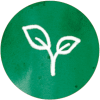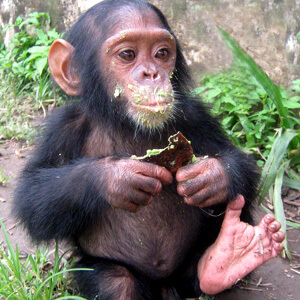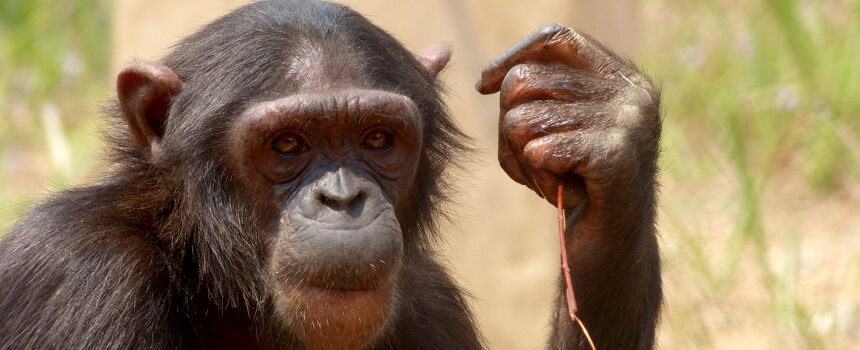 Support for the monkey orphanage
Support for the monkey orphanage
Medical care of sick chimpanzees in the Democratic Republic of Congo
Coughs, sneezing and sore throat are affliction we humans know too well, especially in the run-up to Christmas and great apes also suffer from such ailments. In animal rescue centres, with animals living so close together, viruses can spread like wildfire. So a bout of flew can quickly affect all of them. At the monkey orphanage J.A.C.K. (the French acronym for “Young animals that have been rescued in Katagana”) and its connected large grounds, there are currently 35 chimpanzees that are hit by an epidemic at least twice per year. Because these primates have a very vulnerable respiratory system, they need care quickly and effectively as not doing so could result in them catching pneumonia, which would be life-threatening. And this is particularly relevant to the youngest of them: Only fast intervention raises their chances of regaining their freedom.
Necessity
Medication for sick chimpanzees in the monkey orphanage J.A.C.K. in the DRC.
Activity
The medicine is bought locally to treat the affected apes at the animal surgery.
Countable effort
Number of (flu) treatments for apes.
Result
The medical treatment prevents the repeated spread of influenza and other life-threatening respiratory illnesses like pneumonia.
Systemic effect
Improved health of the chimpanzees increases their chances of reintroduction and protects biodiversity.
Background
According to the International Union for the Conservation of Nature (IUCN), chimpanzees are a highly endangered species and threatened with extinction. At the end of the 20th century there were still more than one million chimpanzees in the world, now there are less than 350,000 animals in the wild (Jane Goodall Institute, 2018). A major threat is the loss of their habitat through deforestation and human settlement. But the main cause is poaching: These strictly protected animals are hunted in large numbers for bushmeat and as a delicacy. Young animals left behind are often traded as pets – and that is also the case in the Democratic Republic of Congo.
The monkey orphanage J.A.C.K. is located in Lubumbashi, the capital of th Haut-Katanga province in the southeast of the Democratic Republic of Congo. Since the 1960s, various rebel groups have tried to fight for the independence of the Katanga region from the DRC. This also has to do with natural resources such as cobalt, copper, tin, radium, uranium and diamonds, which are abundant in the region (WDR, 2018). The question of independence and access to natural resources has been the cause of violent conflict for decades. Due to the ongoing conflict, local and international demand, and weak monitoring of government compliance, the trade in monkey meat and monkeys as pets remains a major problem in the DRC despite international agreements and national laws forbidding it (Global Press Journal, 2017).
This is why J.A.C.K. is not only committed to caring for the animals, but also to complying with the Convention on International Trade in Endangered Species of Wild Fauna and Flora and to prosecuting the illegal trade in wild animals. Thanks to the initiatives of animal protection programmes and rescue centres, the protection of animals is improving to some extent. The authorities only take action against poaching, confiscate illegally traded chimpanzees and bring them to the rescue centres if there are enough of these and appropriate accommodation for the animals.
The good deed
With today’s good deed, you are funding one dose of medication for a chimpanzee in the J.A.C.K. rescue centre. Due to the frequent outbreaks of respiratory infections – which sometimes can be severe or chronic – pain-relieving and antipyretic syrups (ibuprofen), cough remedies and vitamin preparations are needed. Animal preparations are not available or unaffordable in the Democratic Republic of Congo, but primates can be treated with human products. From time to time, different medication is needed to treat other emerging diseases. Your donation makes it possible for the animals to receive medical care, to be nurtured and lovingly looked after. This is essential to increase the chances of reintroduction.

AboutDemocratic Republic of Congo
Kinshasa
Capital
81 331 050
Number of inhabitants
796
Gross domestic product per capita per year
176
Human Development Index
The Democratic Republic of Congo is the second-largest country in Africa and is rich in natural resources. As a result of being in a continued state of war and the increase in population, it is still one of the least developed countries in the world.
About the organization and further information
Association
Pro Wildlife e.V.
Website
Initiative Transparente Zivilgesellschaft
Further information and source
- Global Press Journal, 2017. Rare Delicacy in DRC connected to wildlife trafficking.
- IUCN, 2018. Rote Liste der gefährdeten Arten (IUCN).
- Westdeutscher Rundfunk, 2018. Planet Wissen. Kampf um die Kongo-Schätze.
- Wildlife Conservation Society, 2016. Status of gorillas and chimpanzees in DRC
- Jane Goodall Institute, 2018. State of Wild chimpanzee.
- New York Times, 2017. Smuggled, Beaten and Drugged: The Illicit Global Ape Trade.




